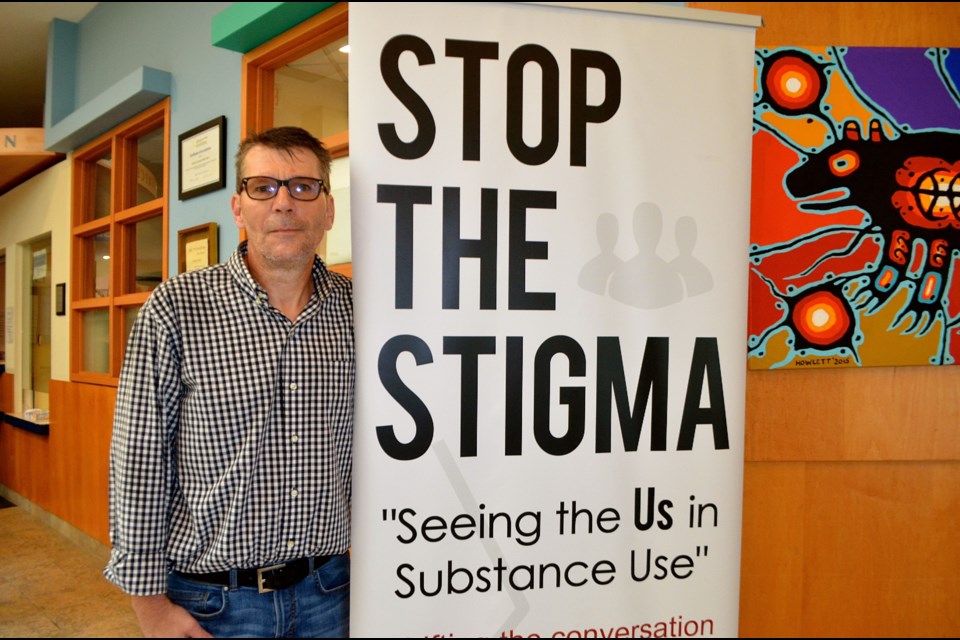One sound every parent of a drug addict fears is the phone ringing late at night. It’s a fear recovering addict and activist Donnie Hay knows all too well.
“My stepfather was a trucker,” said Hay. “When he was away at night he would call twice and hang up then call back and my mother would answer the third time. Otherwise she wouldn’t answer the phone at night. It had to be horrible for her.”
She wouldn’t answer late at night because she feared it was someone calling to tell her that her son, Donnie, had died of a drug overdose.
“I have been a recovering addict since 2009,” said Hay. “I went to Homewood and I also went to Stonehenge. I know the torment and I understand the anguish and the desperation because I have been there. It’s just got to stop.”
What has to stop, according to Hay, is the lethal cycle of substance abuse, addiction and death that is plaguing Guelph and communities across Canada and North America.
Every time he hears the sirens of an ambulance he shudders and wonders if he has lost another friend.
“When one person dies under the age of 30 we lose two generations – their kids and their children’s children,” he said. “We can’t replace them. We need them to take over the world one day.”
To stop the cycle Hay has become an advocate for addicts in Guelph and 10 weeks ago he started a petition to get a permanent medical detox centre established in the city.
He has collected more than 750 signatures and will be speaking at the third annual Stop the Stigma Rally Friday Sep 28 from 11:30 a.m. to 1:30 p.m. at Guelph City Hall.
The rally is organized by the Wellington Guelph Drug Strategy and Partners and will feature speeches by health professionals and others impacted by street drugs and substance abuse.
“I have met with Donnie and I signed the petition, not officially as the drug strategy manager, but as someone who lives in Guelph,” said Adrienne Crowder, Wellington Guelph Drug Strategy Manager at the Guelph Community Health Centre.
”I really advocate Donnie’s efforts to raise our awareness about the need for withdrawal management because I think he is speaking to his experience in the community. He and people like him are an important source of feedback.”
Hay’s experience with drug use and addiction, like many, is rooted in childhood trauma. Abuse, Hay says, occurred at the hands of a trusted person.
It was 1973 and a difficult time for a young single mother with two young boys – one of who was suffering from emotional and physical abuse. Hay's mother believed the best she could do for him was leave him with medical professionals.
“As soon as I saw my mother and that lady driving away, I snapped and they injected me with liquid Valium,” said Hay. “They put me in a locked room overlooking the lake. So, I am standing there feeling like a million dollars looking at the lake and how peaceful and beautiful it was. I knew right there and then.”
He knew there and then that Valium and eventually heavier drugs could numb the pain. All he had to do to get the drugs was to throw a fit, break things or get in a fight.
“I was in there for a year,” he said. “I went home with a two-year prescription for Valium and my mother had one in my mouth before I even opened my eyes so I could go to school.”
For 35 years he slipped deeper and deeper into drug use, got in trouble with the law and in the process lost his job, his marriage and his relationship with his two daughters.
The drugs began to take a toll on his health and he nearly lost his leg to an infection.
The shame and stigma of being an addict led him to seek the company of other addicts.
It is a pattern Gail Hoekstra, executive director at the Drop In Centre, has seen repeated time and again as addicts struggle to get clean.
“You are not getting the nine-to-five job,” said Hoekstra. “You lose your community because one beautiful thing about people that are using is that they will be together. They have a community and they will use because I think they feel less shameful when they are using together.”
Drug addiction, said Crowder, is a health issue and should be treated that way.
“We don’t criminalize other health conditions and that is part of where the stigma comes from I believe,” she said. “It happens across all levels of society, all genders, all ages so it is a very human thing but we have a different lens to look at it from. Personally, in my life, I don’t know anybody who put up their hand to be caught in an addiction process.”
Hay believes that Guelph could be a leader in treating a problem that has reached epidemic proportions in communities across much of the Western world.
“I don’t have all the answers but I know I need help doing this,” said Hay. “I’ve taken myself outside the box because it is something I wouldn’t normally do but it’s for the greater good and I understand that now.”
Many of the signatures on his petition are seniors and one of those seniors reminded Hay about the pain experienced by the families of addicts.
“I knew what he was talking about,” said Hay. “He said I am afraid to answer the phone in case they tell me my 42-year-old son died of a drug overdose. I am afraid to answer the phone at night.”